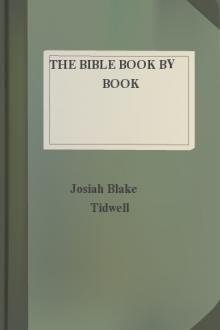Genre - Philosophy. You are on the page - 26

ach expresses eternal and infinite essentiality. Explanation-I say absolutely infinite, not infinite after its kind : for, of a thing infinite only after its kind, infinite attributes may be denied ; but that which is absolutely infinite, contains in its essence whatever expresses reality, and involves no negation.VII. That thing is called free, which exists solely by the necessity of its own nature, and of which the action is determined by itself alone. On the other hand, that thing is

cordingly: (1) The Strong one used 225 times in theOld Testament; (2) The Strong one as an object of worship; (3) TheStrong one who is faithful and, therefore, to be trusted and obeyed.This last is a plural term and is used 2300 times in the OldTestament. It is the name used when God said. "Let us make man" and"God created man in his own image," etc., Gen. 1:26-27. It was by thisname that God the Trinity covenanted for the good of man before manwas created.2. LORD. Small

ave himself from cipherdom, find an affirmative position. His thousand and three affairs of gallantry, after becoming, at most, two immature intrigues leading to sordid and prolonged complications and humiliations, have been discarded altogether as unworthy of his philosophic dignity and compromising to his newly acknowledged position as the founder of a school. Instead of pretending to read Ovid he does actually read Schopenhaur and Nietzsche, studies Westermarck, and is concerned for the

that faith is likewise about propositions; so that its object is something complex. I answer that, The thing known is in the knower according to the mode of the knower. Now the mode proper to the human intellect is to know the truth by synthesis and analysis, as stated in the First Part (Q. 85, A. 5). Hence things that are simple in themselves, are known by the intellect with a certain amount of complexity, just as on the other hand, the Divine intellect knows, without any complexity, things

secure society against oneof the most destructive but insidious institutions of popery; Americanfemales, an appeal to them of the most solemn kind, to beware ofConvents, and all who attempt to inveigle our unsuspecting daughtersinto them, by the secret apparatus of Jesuit schools. The author of thisbook was a small, slender, uneducated, and persecuted young woman, whosought refuge in our country without a protector; but she showed theresolution and boldness of a heroine, in confronting her

table. Our next chapter, therefore, will be concerned with the reasons for supposing that there is a real table at all.Before we go farther it will be well to consider for a moment what it is that we have discovered so far. It has appeared that, if we take any common object of the sort that is supposed to be known by the senses, what the senses immediately tell us is not the truth about the object as it is apart from us, but only the truth about certain sense-data which, so far as we can see,